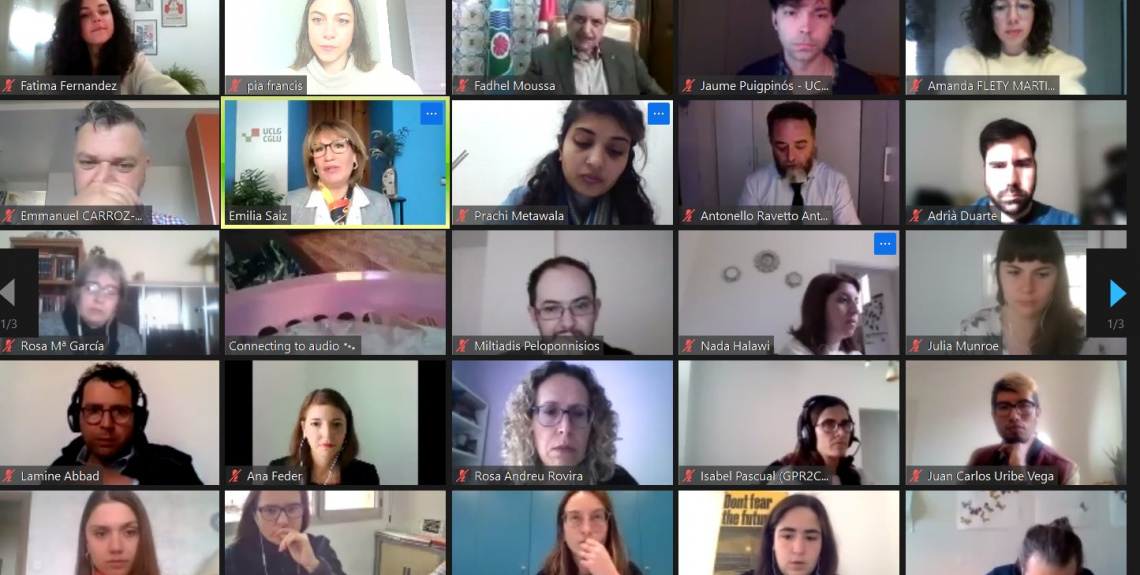An MC2CM Peer Learning event held last March 16-18 by Grenoble addressed the concept of “local inclusive citizenship” in connection to the social inclusion of migrant residents. This dialogue provided a meaningful platform for members and partners from our Committee to showcase the existing wealth of experiences on this topic from a human rights and right to the city perspective - altogether with MC2CM members and other key partners in the Euromediterranean region. Its outcomes will nourish the UCLG conversation on how to renew the “local social contract” and adopt a “Pact for the People” in the COVID-19 aftermath.
Held throughout three days of intense sharing of ideas, the event gathered good level of political attention towards a key concept in current human rights and right to the city discussions: that of local citizenship (also referred to in various contexts as urban citizenship or inclusive citizenship). This frontier concept represents a key policy innovation and contribution by local stakeholders to global human rights guarantee.
Indeed, the local citizenship vision has allowed to reclaim and establish effective policy pathways to guarantee human rights’ when those are deprived (especially due to lack of citizenship status) but also reinvent inclusion and caring .
In order to trigger peer-to-peer learning among participants, the event was mostly structured around three thematic sessions that combined the use of interactive learning methodologies (such as role playing and urban storytelling) with the presentation of practices. These sessions covered three topics considered key to build local inclusive citizenship:
- Local mechanisms on human rights protection and non-discrimination;
- Local innovations to overcome administrative barriers and foster cooperation;
- Establishing local institutions to foster migrants’ political participation and social recognition.

Members and active local governments within our Committee took an active role in the event either by presenting their own policies or by actively participating in the conversations and thematic workshops organized.
[ Know more about this concept by exploring this thematic background document by the CSIPDHR ]
The host city of Grenoble took an active role throughout the event and shared relevant initiatives in the field of awareness raising, participatory democracy and civil society engagement. Valencia and Barcelona presented innovative practices in the field of human rights guarantee - the former a local plan to foster conviviality and non-discrimination; the later having implemented various mechanisms that favour naturalization processes and protect migrant residents from deportation.
"Grenoble remains committed towards making the city more inclusive, with a vision on migration governance based on the three key principles of hospitality, citizenship for all and unconditionality. We strongly believe that citizenship is an unconditional aspect of life. It is our responsibility to ensure that no migrants are excluded from accessing municipal rights and services"
Emmanuel Carroz, Deputy Mayor of Grenoble
Represented by its Mayor Fadhel Moussa, the Tunisian city of L’Ariana shared his political vision on the concept, advocating for the mainstreaming of inclusiveness and universality values in local policymaking. Sousse, also in Tunisia, presented a more specific example of policy-making, which stresses the role of participatory democracy in fostering civic inclusion and addressing stereotypes. The Seine Saint Denis Departmental Council also addressed the notion of citizenship through more “soft terms”, highlighting for instance the role of decentralized cooperation and intercultural dialogue practices to reinvent our understanding of conviviality, development and identity.
Other local authorities from our Committee joined these discussions as well, including Granollers, Grigny, Gwangju and Utrecht. Other participating partner organizations included the Fons Català de Cooperació, the Union of Young Elected Local Governments of Greece, CODAS Caritas Douala, INFID Indonesia and the Global Platform for the Right to the City.
Interested about this Peer Learning event? Would you like to expand your knowledge about Local Citizenship?
Read the final report and Peer Learning Note developed by UCLG Learning, MC2CM and our Committee!



